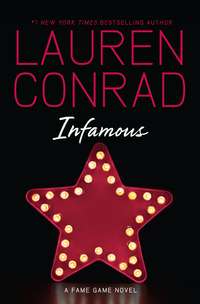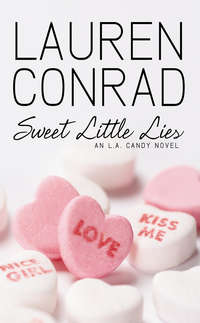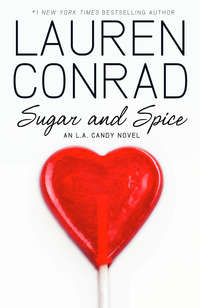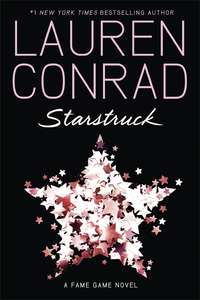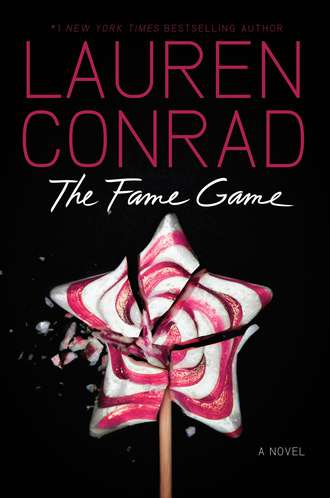
Полная версия
The Fame Game
“Well, you’re just going to have to get out there more,” Jess said matter-of-factly. “Like I said, keep dribbling. What about that show you emailed me about?”
“That’s the interview I’m late for,” Kate admitted. She craned her neck out the window, trying to see past the Escalade. Was there construction? An accident? “I don’t know why people insist on driving SUVs in L.A. It isn’t exactly known for its rough terrain,” she huffed.
“Stay focused,” Jess said. “Tell me about this show.”
“It’s about four girls trying to make it in Los Angeles,” Kate said. “It’s by the people who did that show L.A. Candy,” she added, slightly embarrassed. (But also kind of thrilled.)
Jess hooted. “Shut up! You didn’t tell me that.”
“Hey, you loved that show as much as I did,” Kate laughed. “So don’t pretend like you didn’t.”
“Guilty as charged,” Jess said. “I always had a soft spot for Scarlett.”
“Yeah, me too.” Kate had loved Jane Roberts, of course, but Scarlett Harp was her favorite. Scarlett was smart, sassy, and down-to-earth, and she didn’t care about hair or makeup or fame. Or so it had seemed, anyway. But in an interview after she left the show, Scarlett had complained that the producers had edited her life into something that it wasn’t. The real me got left somewhere on the cutting room floor, she’d said.
That line had stuck with Kate, especially after her first meeting with Dana, in which the seemingly perpetually stressed-out woman had grilled her about her dating life (“um, a little slow these days since I’m holding down two jobs—you know, to afford my rock ’n’ roll lifestyle”—that got a smile out of Dana at least), her exercise routine (“I wouldn’t call it a routine, exactly”), her family (“single mom, normal, nice, and almost two thousand miles away”—she hadn’t felt like bringing up her father, who had died when she was ten, but figured she might have to eventually if she made it onto the show), and a hundred other things. If the PopTV people offered her the part, would she be able to be herself in front of a camera? And if by some miracle she could, would they edit that real self into something different? It was a worrisome thought.
“But being on a TV show—that’s totally amazing,” Jess went on. “I mean, you could be a star!”
“Yeah, right,” Kate said, applying a little lip gloss touch-up in her rearview mirror. “Let’s not set our hopes too high.”
“Well, at the very least you’ll get paid well,” Jess pointed out.
Kate’s ears pricked up at this. “Paid well?”
Jess laughed. “Yes, dummy. What, you think it’s like some kind of extended open mic, where you do it for free?”
“Oh, uh, no, of course not,” Kate stammered. The truth was she hadn’t even considered the fact that she might get paid. Weren’t there millions of girls across the U.S. who’d give anything to be on a PopTV show? Trevor Lord could sell his spots to the highest bidder if he wanted to.
Suddenly she felt even more grateful that Dana had stumbled into her branch of the Coffee Bean & Tea Leaf. What if she actually nailed the audition? Money meant being able to quit at least one of her two jobs. Money meant being able to afford an eight-track digital recorder or a new MacBook with a functioning version of GarageBand—or, even better, time in an actual studio. Money meant her mom couldn’t drag her back to Columbus.
“You’re such a nerd,” Jess said affectionately.
“I know,” Kate said. “Believe me, I know.”
Ahead of her, the Escalade began to pick up speed, and Kate was able to shift into second gear for the first time in ten minutes.
“You’re going to do great,” Jess assured her.
Kate felt her heart flutter lightly in her chest. If she could just keep moving, she’d be only five minutes late to meet Trevor Lord. She had made up her mind: Forget stage fright. She was going to rock this interview.
“I should go, Jess,” she said. “Love you. Call you later.”
As Kate sailed through the intersection, she glanced up and saw Madison Parker, probably thirty feet tall, smiling down at her from a giant billboard. It was an ad for Madison’s Makeovers. Beauty’s a bitch read the tagline.
Kate smiled in return. Madison hovered over the corner of Venice and Sepulveda like some guardian angel of reality TV.
Surely that was a good sign.

Carmen Curtis rushed around her bedroom, madly searching for her new brown leather ankle boots. Shoe boxes and shopping bags were littered across her floor, testament to an outrageous (even by Carmen’s standards) shopping extravaganza that had taken place earlier that day. Three nine-hundred-dollar sweaters dangled off the edge of her bed, and a ridiculously expensive silk dress lay, already crumpled, in a corner. Even though the amount of free clothing and accessories that were sent to her mother could fill a room in their very large, but not obscene, house, the two always spent a day demolishing Barneys before Cassandra left on tour. Cassandra would soon be leaving for ten sold-out concerts in Japan and Australia, so they had practically emptied the place out.
Plus, they were celebrating Carmen’s news: She was going to be on The Fame Game, Trevor Lord’s newest reality series. Filming began in two weeks, and now Carm had a pile of cute things to wear.
She had been worried that her mom might not want her working in “reality” TV (after all, there was nothing real about it), especially since the whole family had been the subject of a documentary about Cassandra’s comeback tour nearly a decade earlier. Cassandra had had extremely mixed feelings about Cassandra’s Back, but she said that The Fame Game sounded cute. She also agreed with their publicist, Sam, who argued that it was the perfect thing to help Carmen out of the shoplifting mess she’d gotten herself into a few months earlier.
Carmen tossed a new lacy La Perla bra on top of her dresser and flung a pretty little Lanvin handbag onto the chaise longue. Where were those damn ankle boots?
For the record, she hadn’t actually shoplifted anything. But it had been a crazy time in her life, full of ups and downs. Ups: She’d just graduated high school and was free from the tyranny of textbooks. Her role in an indie movie about estranged sisters who go on a road trip to find their mom, which she’d filmed the summer before her senior year, was getting great reviews. (She only wished the critics didn’t sound so shocked, as if they’d assumed she got the part only because of who her parents were. Which, okay, hadn’t hurt—her dad was a producer on the film, after all—but the director wouldn’t have cast her if she couldn’t act.) But there were downs, too: She’d deferred her acceptance to Sarah Lawrence because she wasn’t convinced college was for her, and her dad wasn’t thrilled about it. She’d broken up with her boyfriend of six months when she saw pictures of him on D-lish.com getting a lap dance. (Somehow “liar” and “cheater” had not been included in his photo caption when the jerk made it into People’s Most Beautiful issue; even worse, he’d managed to spin it so that Carmen was perceived as “needy” and he was oppressed in the relationship.) And she’d taken the blame for shoplifting a Phillip Lim top because her friend Fawn was still on probation from her last failed attempt at a five-finger discount, and she was afraid the judge wouldn’t be so lenient this time. Naturally the tabloids ran with it.
That particular incident had pissed off her dad even more—at first because he’d thought she’d done it (thanks for the vote of confidence, Dad!), and then because she’d taken the blame for someone he’d never really liked that much in the first place. Ever since Carmen had started hanging out with Fawn after they’d met at an acting workshop, her dad had grumbled about how he wished she’d find friends her own age. (Fawn was only two years older—no biggie.) But all of this meant that Philip Curtis was not exactly keen on his daughter’s judgment as of late, which was going to make it somewhat difficult to persuade him that a role on The Fame Game would not exploit her, goad her into getting breast implants, or otherwise ruin her life.
She had to make him understand that she knew exactly what she was getting into. She’d grown up in L.A.—around actors, writers, singers, directors, producers—and she knew how the game was played; now she wanted to officially get into it. She’d spent the past few years dabbling, taking acting classes and working hard, yeah, but dabbling nonetheless. She’d never committed to auditioning, hadn’t much cared about her “image,” and had been content to coast along as mini-Cassandra. Now she was ready to take what could so easily be hers.
But convincing Philip Curtis of anything that he didn’t think up himself—well, that could be a challenge. As he was fond of saying, I didn’t get to be the founder and president of Rock It! Records by doing what people told me to do or thinking what people wanted me to think.
Yeah, yeah, yeah, Carmen thought. Anyway, the point was, she was trying not to do what people told her to do. Her dad wanted her to go to college? Well, she had a better idea. She adored him, she really did, but she could do without his stubbornness sometimes. Whenever she tried to turn it around and tell him that she agreed wholeheartedly with his “think for yourself” philosophy, that it was exactly what she was trying to do, he refused to engage. He’d just look at her calmly and then wander away, as if the conversation had been a competition and he had already won it. The only person he could never pull that with was Cassandra.
“Carm,” her mother called from downstairs. “Drew is here. And dinner’s almost ready.”
“Coming,” Carmen called back. Too bad: She was going to have to eat dinner sans her fantastic new ankle boots.
Just as it was a tradition for Carmen and her mom to shop before Cassandra went on tour, it was a longstanding tradition for her family to have a big meal at home on Friday nights. Drew Scott being invited was now tradition, too. He was her best friend, and he’d been at the table at least every other week since Carmen was in tenth grade and he was in eleventh. Drew’s mom, an entertainment lawyer, and his dad, a dermatologist to the stars, had been in the midst of an ugly divorce back then, and Drew liked to avoid them as much as possible. Even now that peace (aka total avoidance) reigned between his parents and he lived on campus at UCLA during the school year, Drew still showed up at the Curtis family’s dinner table. Often he’d even wear an Oxford over his tattooed arms and his hair nicely combed.
Carmen slipped on her pink custom-made Chopard watch—her graduation present from her parents when she finished at Archer—and ran downstairs to the living room, where her dad had cornered Drew to chat him up about some band he’d just signed. (Drew was studying composing and music production at UCLA, so he liked talking shop.) Just as Carmen headed toward them, her mom floated into the room. Seriously, Cassandra Curtis never did anything as pedestrian as walk. Even in jeans and a plain white sweater, she looked amazing, her dark hair in perfect waves and her light olive skin perfectly dewy, as if she’d stepped off the cover of Vogue—which, incidentally, she had actually been on three times and counting.
“The salmon is ready, everyone,” Cassandra said. Her voice was smooth and sultry, even when she was talking about dinner. “Carm, hon, you look fabulous—I love those L’Wren Scott skinnies on you.” She leaned closer to her daughter and whispered, smilingly, “Just don’t tell your father how much they cost.” Philip Curtis didn’t actually care what they spent on clothes, but it was a running joke at their house: How many pairs of shoes and jeans could two women possibly own? Then, at a normal volume, her mom mused, “What I wouldn’t give to be able to get away with white jeans.”
Carmen rolled her eyes. “Yeah, Mom, you’re huge. Better skip dinner. It’s lemon juice and cayenne pepper for you tonight.”
Drew detached himself from Carmen’s dad and walked over to plant a kiss on her cheek. “Curtis,” he said.
“Scott,” Carmen returned, then punched him gently on the arm.
“No hitting before dinner,” Drew said, laughing.
“That’s right,” Cassandra said. “We save violence for dessert.”
In the huge, French-blue dining room, Philip took his usual spot at the head of the table and Cassandra sat at hers on the other end. Carmen and Drew sat across from each other, a gigantic spray of hot-pink lilies between them. Philip cleared his throat and lifted his wineglass. “A toast to my amazing wife and daughter. May they remain forever beautiful and never grow tired of me.”
Carmen giggled—it was the same thing he said every Friday night. She raised her glass of Perrier. “And to Philip Alan Curtis, beloved husband and father. May he one day manage to come up with a new toast.”
As they ate, they bantered lightly about music (what exactly was the difference between speed metal and grindcore?) and sports (were the Lakers going to take the championship this year?). But Carmen, uncharacteristically, said little. She was waiting for the right moment to talk to her dad again about The Fame Game. The last time she’d brought it up, the conversation hadn’t gone well, and back then it was only a possibility. Now it was a done deal. Her mother had made her promise to tell him at dinner.
What her dad didn’t seem to fully comprehend for some reason was that Carmen’s life had always been in the spotlight. Heck, she’d been on the cover of Us Weekly when she was in utero (Crooner Cassandra’s Baby Bump!), and her toddler outfits had been the subject of gallons of tabloid ink (Baby CC: The World’s Littlest Fashionista?). The way Carmen saw it, the PopTV show was an opportunity to step into the limelight on her own terms. The cameras would film her because she wanted them to, not because they were manned by guys from TMZ who were itching to catch her stumbling drunkenly out of a nightclub or flashing her thong, or lack thereof, as she exited a car. Her entire life had been narrated by the media and she had had so little say. This was a chance for her to show people who she really was.
Trevor Lord’s reality series would prove to the world that Carmen wasn’t just another celebuspawn. She was a real person with real feelings, and she was an actress—and she’d have been an actress no matter who her parents were.
Carmen cleared her throat. It probably wasn’t the right moment, but maybe there was no such thing as a right moment for a conversation like this. She took a careful sip of her water. “So, remember that thing I told you about, Daddy?” she asked. “The opportunity my agent got approached with?”
Drew stifled a laugh, and Carmen kicked him under the table. Drew thought that Carmen was “above” reality TV and that “opportunity” was a euphemism for “bad idea.” She’d never been able to get him to watch L.A. Candy, so maybe it was understandable that he didn’t see the appeal of The Fame Game. Still, he’d come around to the idea eventually, though he knew her dad wouldn’t be on board.
“Tell me it wasn’t another Playboy request,” Philip half hollered. “I’ll kill Hef with my bare hands if they ask you to be naked in that magazine one more time.”
Carmen flushed. “Ick!” she said. “No, the offer from PopTV.”
“You mean PopTV Films,” Philip said.
Carmen’s stomach fluttered. Had he really forgotten the conversation they had had about it just last week? Or was he trying to pretend that it hadn’t happened? “No, Daddy,” she said. “PopTV. You know, Trevor Lord’s new show?”
Philip’s brows furrowed gently. “Trevor Lord? Why does that name sound familiar?” he asked.
“He produced L.A. Candy,” Carmen told him. (For the second time.)
“The reality show?” He said “reality show” as if they were dirty words. Kind of like Drew had when she’d first told him.
Carmen glanced through the spray of lilies at Drew. His green eyes were full of sympathy already. He just wanted what was best for her. (And sometimes Carmen couldn’t help but wonder if he simply wanted her. There had been a few moments in the last month or so—some extra-long hugs, a bit of hand holding, and one awkward, sweet kiss . . . But now wasn’t the time to think about that.) She smiled at Drew and looked back at her father.
Before Carm could respond to him, though, Philip’s cell phone buzzed and he slipped it from his pocket. He glanced at the screen and looked apologetically at Cassandra. “I have to take this.”
“The music business is twenty-four/seven.” Cassandra rolled her eyes toward the ceiling and smiled.
“Well,” Carmen said when her dad had left the room, “so far so good.”
“You think?” her mother replied.
“I was being sarcastic.”
“Give him a chance,” Cassandra said gently. “Believe it or not, he does trust you.”
Drew reached out and moved the flowers to the antique credenza behind him. “There,” he said, “now I can see the future star of The Fame Game.”
“Seriously, you guys,” Carmen said. “You have to help me out on this one. Be, like, supportive.” Help me show the world I’m not Little CC anymore, she thought but didn’t say.
In a moment, Philip returned to the table. As he tucked his phone back into his pocket, Cassandra shot him a pointed look.
Philip smiled at his only daughter. “Carm? You were saying something about PopTV?”
Carmen took a deep breath and began. Again. “Trevor Lord is doing a show about people trying to make it in Hollywood. He said he needed a talented actress, and that I was his first and only choice. He said the network probably wouldn’t even pick up the show unless I agreed to do it.” She’d felt a rush of pride when her new manager (her dad made her get a manager after she got cast in The Long and Winding Road) told her that part. She knew it probably wasn’t true; she’d seen her father stretch the truth before, hadn’t she? That’s just how it went in Hollywood. You told people what they needed to hear so they’d do what you wanted them to do. “Daddy, I said I’d take the part and I really want you to be happy for me.”
“But why on earth do you want to do a reality show?” Philip looked genuinely perplexed. He exchanged another unreadable glance with Cassandra. “Those girls have no values. No talent! You’re not like them. You’re an actress.”
“I told you,” she said, feeling herself getting upset, “it’s not like that.” She hated when her father used his I’m disappointed in you tone. “It’s about people trying to become successful doing what they love. It’s a good opportunity.” Carmen twisted her watch around her wrist.
“For what? To go to clubs and get in fistfights?”
“That’s Jersey Shore,” Drew clarified helpfully. “This will be more like catfights—open-handed combat, drinks thrown. . . . It’s completely different.”
Carmen kicked him again. “Not helping!” She turned to her dad. “There aren’t going to be any fistfights or catfights. It’s going to be about the business and how hard it is to make it—in my case, even when your parents are, y’know, you guys.”
“Famous,” Drew added, as if that were necessary. Carmen contemplated kicking him again but decided against it. It didn’t seem to make a difference.
“Are ‘us guys’ going to have to be on this show?” her dad asked. “A Very Special Meet the Curtises episode?” He was joking, but Carmen could tell he wasn’t into the idea at all.
“If they need that, they can just splice in scenes from the brilliant, amazing Cassandra’s Back documentary,” her mom offered teasingly. (Every time she mentioned the title, she shrugged and turned her head over one shoulder, mimicking what she had decided was the hilarious poster for it, what with its nod to the title’s double entendre.)
Philip took a sip of wine and sighed. “Carm, I’m not going to forbid you to do what you want. I just want you to be sure you know what you’re getting yourself into. Eyes wide open, right?”
Carmen nodded. “Eyes wide open.”
Her dad looked at her—really looked at her—and Carmen, who could usually tell when her dad was about to soften, couldn’t read his expression. “Okay,” he said finally. “Well, I guess that’s settled then.”
Carmen let out a breath she didn’t even realize she was holding. She faced forward again and found Drew staring at her, his eyes . . . wide open.
“Shut up,” she said, and kicked him once more.
“Ouch! You were supposed to save the violence for dessert, remember?”
Cassandra laughed. “Next time,” she said, “on a Very Special Episode of Meet the Curtises: Violent dinners. Savage Salmon. Brutal Broccoli. And—”
“Killer Cake!” Philip yelled. He grinned boyishly. “Chocolate, perhaps?”
“We’re not having cake, Tubs,” Cassandra said fondly, using the nickname he loved and hated in equal measure. After all, Philip Curtis wasn’t at all fat; he just had a little . . . girth.
“Nice try, Mr. Curtis,” Drew said.
“Sadistic Sorbet?” he asked hopefully.
And then everyone cracked up. Carmen breathed a sigh of relief—the worst was over now. But she really, really hoped that Trevor Lord wouldn’t angle for a Curtis family episode. They were just way too weird.

Flashes—dozens of them—exploded in bursts of brilliant light, and Madison heard her name called out over and over. “Miss Parker!” “Madison, over here!” “Mad, honey, blow me a kiss!”
Madison paused midway on the red carpet, absorbing the attention being showered upon her. She never got tired of this moment: when every eye and (much more importantly) every camera was focused on her. She offered a small, knowing smile to the bank of photographers to her left, but she made sure to avoid glancing at the PopTV camera that followed her every move. That was the one camera she had to pretend not to see.
The last two weeks had been a whirlwind. Trevor wanted to start filming immediately—clearly Madison’s fans were clamoring for her return!—and so the minute the ink was dry on her contract, four beefy moving guys had showed up at her Beverly Hills doorstep, packed up her three hundred dresses and her two hundred pairs of shoes, and hauled them over to a sleek new apartment in Park Towers. There was a balcony, a chef’s kitchen, and three large bedrooms: one for Madison; one for her new roommate, Gaby; and one for all the PopTV equipment.
“Who are you wearing?” someone called out, but Madison didn’t answer. She liked to seem a little bit aloof at first. Keep ’em guessing, she thought.
Up ahead, a giant gold banner welcomed everyone to the second annual Togs for Tots benefit. Togs for Tots was a charity that provided new (not “gently used”—gross!) clothes to foster children, group-home residents, and homeless kids all over L.A. County. Madison didn’t particularly care about the charity itself, of course, but the evening was sponsored in part by Elie Saab, one of Madison’s favorite designers, and rumor had it that Anna Wintour of Vogue would be in attendance.
She took another few steps, then gave her best over-the-shoulder smirk. Shutters clicked furiously. The paparazzi that lined red carpets were always a step up from the ones who roamed the streets. A little more polished and respectful, although there was always an aggressive few screaming over the others from behind the velvet rope barrier. But Madison knew that she needed them all, just as much as they needed her. It was a symbiotic relationship (with escalating benefits): The more famous she got, the more they would want to take her picture; the more pictures they took and published of her, the more famous she’d be . . . and onward and upward to, as Trevor put it, the “next level.”
She held her head high, pivoted her toe in her Louboutins, and smiled her picture-perfect smile.
“Madison!”
“Over here!”
“This way!”
“Beautiful, Madison!”
She locked eyes with each individual lens. Every camera contained the potential for a “Who wore it best?” (she did, always), a post on glamour.com (Madison stuns in red!), or a spot on tomorrow’s Fashion Police (being praised, not critiqued of course). Madison hadn’t quite made it out of the weeklies yet (though Life & Style, to its credit, loved her like no other), but Sasha, her publicist, swore she’d land a cover of a monthly once The Fame Game started airing. Madison was already planning her Glamour cover look. She was thinking a sort of Marlene Dietrich pose, or perhaps a Marilyn Monroe homage. . . .


